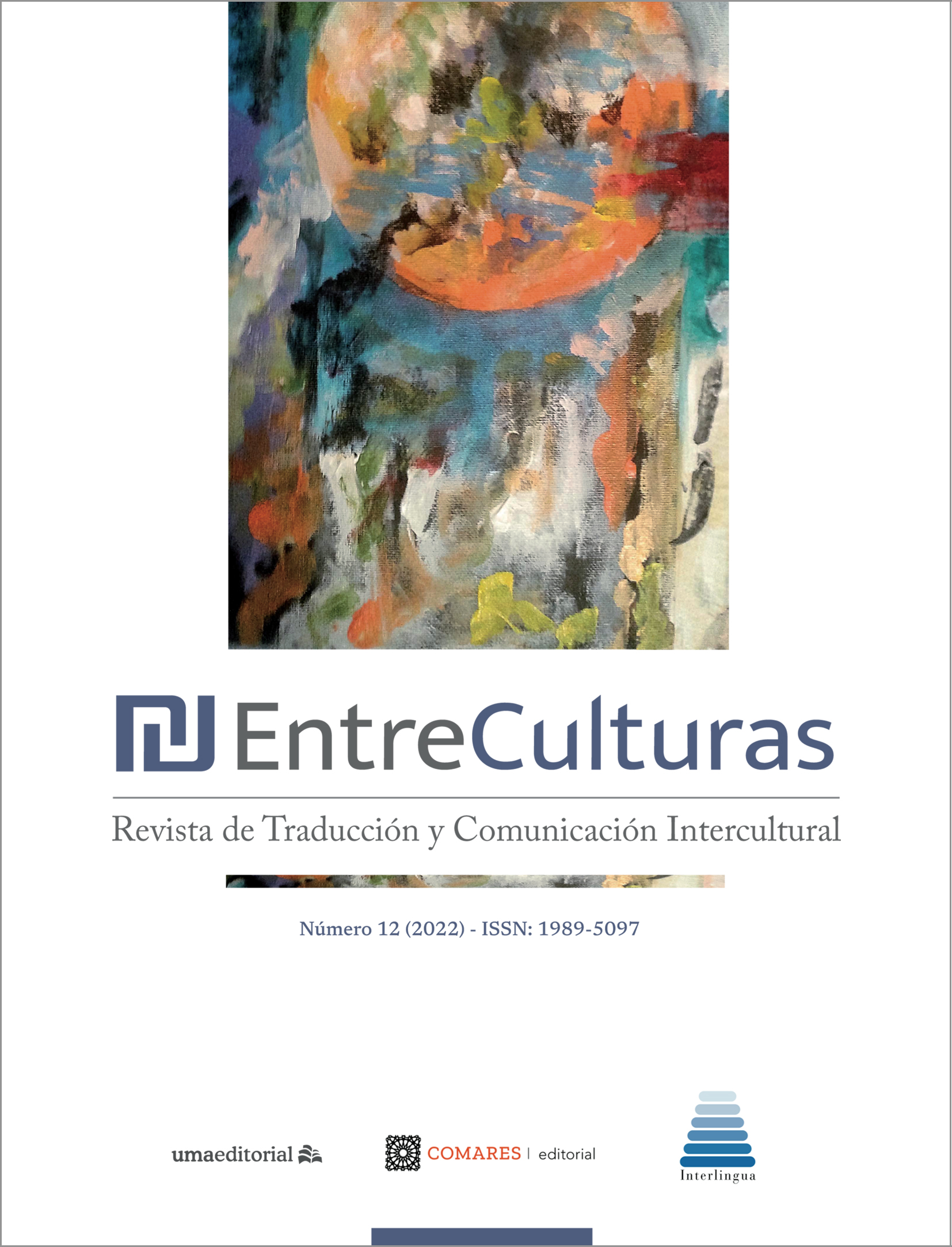Students perceptions about knowledge acquisition in translation teaching and learning
DOI:
https://doi.org/10.24310/Entreculturasertci.vi12.13811Keywords:
Knowledge, translation, students, teaching, learningAbstract
This research aims to analyze the students’ perceptions about knowledge acquisition when graduating from the first generation of the Certificate Program in Translation and Interpreting at the Universidad Veracruzana (UV), México. Its orientation is descriptive and narrative and employs the case study as a methodology strategy and the focus group as a research method. The study population was 18 students. The collected data were analyzed by using qualitative content analysis. This method was helpful to identify particularities about the students’ education process. The study identified that students learned translation fundamental aspects. Their educational experiences helped to think about different changes or proposals to the next Certificate Program generation and implement a graduate translation program.
Downloads
Metrics
References
Andreu, J. (2000): «Las técnicas de análisis de contenido: Una revisión actualizada», Fundación Centro Estudios Andaluces, Universidad de Granada, 10, 1-34.
Chevallard, Yves (2000): La transposición didáctica. Del Saber Sabio Al Saber Sabio. Buenos Aires, Aique Grupo Editor S. A.
Delors, Jacques (1996): La educación encierra un tesoro. Madrid, Santillana/Ediciones, UNESCO.
Durieux, C. (2005): «L’enseignement de la traduction : enjeux et démarches», META, 50, 36-47.
Fortoul-Olliver, M. B. (2017): «Los distintos tipos de saberes en las escuelas: su relevancia en la formación de sujetos», Revista del Centro de Investigación. Universidad La Salle, 13, 171-196.
Foucault, Michel. (2002): La arqueología del saber. -1ª ed (Trad. Garzón del Camino, A.). Buenos Aires, Siglo XXI Editores.
Gregorio, A. (2017): «Problemas de traducción, detección y descripción: un estudio longitudinal en la formación de traductores», Revista Digital de Investigación en Docencia Universitaria, 11, 25-49.
Herbulot, F. (1993): «La formation des traducteurs de demain : savoir-faire et boîte à outils», Équivalences, 23,15-26.
Hurtado, A. (1996a): «La traductología: lingüística y traductología», Trans. Revista de Traductología. (1), 151-160.
Hurtado, A. (2019): «La investigación en didáctica de la traducción. Evolución, enfoques y perspectivas.» en Tolosa Igualada, M. & Echeverri, A. (eds.) 2019. Porque algo tiene que cambiar. La formación de traductores e intérpretes: Presente & futuro / Because something should change: Present & Future Training of Translators and Interpreters. España: Universidad de Alicante.
La Rocca, M. (2007): El Taller de traducción: una metodología didáctica integradora para la enseñanza universitaria de la traducción. Universidad de Vic, Departamento de Traducción e Interpretación. [cd-rom].
Libreros-Cortez, H., & Ortiz-Lovillo, M. del P. (2020): «La adquisición de la competencia traductora en estudiantes de inglés y francés de la Universidad Veracruzana», CIEX Journ@l, 1, 9-18.
Libreros-Cortez, H. & Ortiz-Lovillo, M. del P. (2021): «La formación en traducción en México: documentación y análisis de los programas de estudio». Entreculturas. Revista de traducción y comunicación Intercultural, 11, 85-104.
Lucio, R. (1992): «La construcción del saber y del saber hacer». Revista Educación y Pedagogía, 4 (8-9), 38-56.
Manrique-Tisnés, H. (2008): «Saber y conocimiento: una aproximación plural», Acta Colombiana de Psicología, 11, 89-100.
Martínez, N. R. (2012): «Reseña metodológica sobre los grupos focales», Diálogos, 9, 47-53.
Moreira, M. (2010): «Abandono de la narrativa, enseñanza centrada en el alumno y aprender a aprender críticamente». II Encuentro Nacional de Enseñanza de Ciencias de la Salud y del Ambiente, Niterói, RJ/VI Encuentro Internacional y III Encuentro Nacional de Aprendizaje Significativo. São Paulo.
Morin, Edgar (1999): Los siete saberes de la educación del futuro. Paris, Santillana-UNESCO.
Ortiz-Lovillo, M. del P. & Figueroa-Saavedra, M. (2014): «Los estudios de traducción en la Universidad Veracruzana. Un camino sin final», CPU-e. Revista de investigación Educativa, Número conmemorativo. 40 años del IIE, 80-98.
Piñuel, J. L. (2002): «Epistemología, metodología y técnicas del análisis de contenido», Estudios de Sociolingüística, 3, 1-42.
Rodríguez, Gregorio, Flores, Javier, & García, Eduardo. (1996): Metodología de la Investigación Cualitativa. Madrid, Aljibe.
Saldanha, Gabriela & O’Brien, Sharon. (2014). Research Methodologies in Translation Studies. London & New York, Routledge Taylor & Francis Group.
Scribano, A. (2017): «Miradas cotidianas: el uso de Whatsapp como experiencia de investigación social», Revista Latinoamericana de Metodología de la Investigación Social 7, 8-22.
Simons, Helen (2009): El estudio de caso: teoría y práctica. Madrid, Morata.
Tardif, Maurice (2009): Los saberes docentes y su desarrollo profesional. España, Narcea.
Taylor, Steve & Bogdan, Robert. (1987): Introducción a los métodos cualitativos de investigación: la búsqueda de significados. Barcelona/Buenos Aires/México, PAIDÓS.
Valdez-Gutiérrez, L. (2018): «El traductor en Baja California», en Fernández Acosta, R. L. (coord.): La profesión del traductor en México. México, UIC.
Downloads
Published
How to Cite
Issue
Section
License
All contents published in Entre culturas. Revista de traducción y comunicación intercultural are protected under the Creative Commons Attribution-NonCommercial-ShareAlike 4.0 International (CC BY-NC-SA 4.0) license. All about this license is available in the following link: <http://creativecommons.org/licenses/by-nc-sa/4.0>
Users can copy, use, redistribute, share and exhibit publicly as long as:
- The original source and authorship of the material are cited (Journal, Publisher and URL of the work).
- It is not used for comercial purposes.
- The existence of the license and its especifications are mentioned.
There are two sets of authors’ rights: moral and property rights. Moral rights are perpetual prerogatives, unrenounceable, not-transferable, unalienable, imprescriptible and inembargable. According to authors’ rights legislation, Entreculturas. Revista de traducción y comunicación intercultural recognizes and respects authors moral rights, as well as the ownership of property rights, which will be transferred to University of Malaga in open access. The property rights are referred to the benefits that are gained by the use or the dissemination of works. Entreculturas. Revista de traducción y comunicación intercultural is published in an open access form and it is exclusively licenced by any means for doing or authorising distribution, dissemination, reproduction, , adaptation, translation or arrangement of works.
Authors are responsable for obtaining the necessary permission to use copyrighted images.





7.png)
